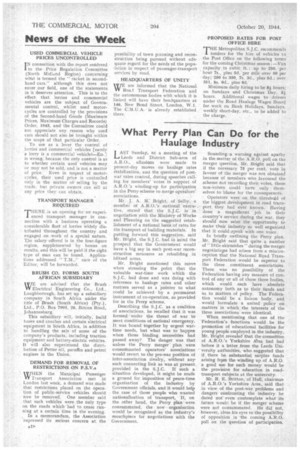What Perry Plan Can Do for the Haulage Industry
Page 20

If you've noticed an error in this article please click here to report it so we can fix it.
LAST Sunday, at a meeting of the Leeds and District Sub-area of A.R.O;, allusions • were made to present-day moves on haulage rates stabilization, and the question of postwar rates control,, during speeches calling for members' votes in support of A.R.O.'s winding-up for participation in the Perry scheme to merge operators' associations.
Mr, J. A. M: Bright, of Selby, a menther of A,R.O.'s national execu. tive, stated that the S.J.C. is in negotiation with the Ministry of Works and Planning on the suggested establishment of a national basis of rates for the transport of building materials. In putting forward this suggestion, said Mr. Bright, the S.J.C. had in mind the prospect that the Government would have a big say in such post-war reconstruction measures as rebuilding in blitzed areas.
Mr. Bright mentioned this move when stressing the point that the valuable war-time work which the S.J.C. had done and was doing with reference to haulage rates and other matters served as a pointer to what could be achieved by a permanent instrument of co-operation, as provided for in the Perry scheme.
Describing the S.J.C. as a coalition of associations, he recalled that it was formedunder the threat of war to meet conditions of national emergency. It was bound together by urgent wartime needs, but what was to happen when those binding necessities had passed away? The danger was that unless the Perry merger plan were consummated operators' associations would revert to the pre-war position of inter-association rivalry, without anysuch connecting link as was at present. provided in the S.J.G. If such a situation developed, it might be made a ground for imposition of peace-time organization of the industry by Government officials, and it would help the case of those people who wanted nationalization of transport. If, on the other hand, the Perry plan' were consummated, the new organization would be recognized as the industry's mouthpiece for negotiations with the Government, Sounding. a warning against apathy in the matter of the A.R.O. poll on the merger question, Mr. Bright said that if the necessary 75 per cent, vote in favour of the merger was not obtained because of members who favoured the scheme not recording their votes, those non-voters could have only themselves to blame for the consequences.
Operators were on the threslickld of the biggest development in road transport they had ever known. Having done a magnificent 'job in their country's service during the war, they should now seize the opportunity to make -their industry so well organized that it could-speak with one voice.
In briefly outlining the Perry plan, Mr. Bright said that quite a number of'' little skirmishes" during the merger negotiatiops had arisen from a mikonception that the National Road Transport Federation would be superior, to the three constituent associations. There was no possibility of the Federation having any measure of control of any or all of those three bodies, which would each have absolute autonomy both as to their funds and as to matters of policy. The Federation would be a liaison body, and would formulate a united policy on matters in which the interests of the three associations were identical.
When mentioning that one of the Federation's functions would be the promotion of educational facilities for young people employed in the industry, Mr. Bright revealed that the committee of A.R.O. 's Yorkshire gtea had had before it a letter from the Leeds University authorities, who suggested that if :there be substantial surplus funds arising frnm the winding up of A.R.O. a good use for such money would be the provision for education in roadtransport subjects at the university.
Mr. R. E. Britton, of Hull, chairman of A.R.O. 's Yorkshire Area, said that in view of the post-war problems and dangers confronting the industry he dared not even contemplate what its future would be if the merger scheme were not consummated. He did not, however, close his eyes to the possibility of opposition in 'the coming A.R.O. poll on the question of participation.




















































